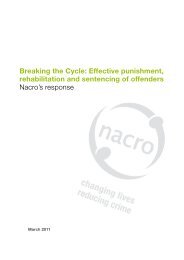Applying for work (with a criminal record): resettlement - Nacro
Applying for work (with a criminal record): resettlement - Nacro
Applying for work (with a criminal record): resettlement - Nacro
You also want an ePaper? Increase the reach of your titles
YUMPU automatically turns print PDFs into web optimized ePapers that Google loves.
Part 3 When to disclose<br />
People may be asked about their <strong>record</strong> or may<br />
choose to disclose it at application stage, after<br />
shortlisting, at interview or job offer stage, or<br />
when they are in post.<br />
At application stage<br />
If an employer is going to ask about <strong>record</strong>s, it<br />
is likely to be at application stage. Where an<br />
application <strong>for</strong>m asks, it might be best <strong>for</strong> the<br />
applicant to put ‘see covering letter’ and in the<br />
letter (see appendix C), give a short account of<br />
the offence and their attitude to it.<br />
Alternatively, they can say that they are<br />
prepared to discuss this at the interview.<br />
The issue of <strong>record</strong>s may be raised indirectly in<br />
other sections of the application <strong>for</strong>m. The<br />
applicant does not need to refer directly to a<br />
<strong>record</strong> in these sections. If the <strong>for</strong>m asks <strong>for</strong><br />
‘reasons <strong>for</strong> leaving job’, they can either leave<br />
the space blank or put ‘see covering letter’,<br />
‘change of circumstances’ or ‘personal<br />
circumstances’ if the reasons are connected<br />
<strong>with</strong> the conviction.<br />
If they have served a prison sentence which<br />
has left a gap in their employment history, they<br />
can write on the <strong>for</strong>m: ‘not in employment’ or<br />
‘unavailable <strong>for</strong> <strong>work</strong> due to personal<br />
circumstances’, and give details in the covering<br />
letter or at interview. This leaves the <strong>for</strong>m free<br />
<strong>for</strong> them to present themselves positively.<br />
Most employers who recruit from written<br />
applications will provide their own <strong>for</strong>m and<br />
job description. Some employers will recruit on<br />
the basis of a CV alone. Applicants are not<br />
expected to disclose convictions on a CV but<br />
they must be prepared to deal <strong>with</strong> the issue,<br />
should the subject of <strong>record</strong>s be raised at<br />
interview. For more in<strong>for</strong>mation about CVs, see<br />
appendix D.<br />
After shortlisting<br />
A few employers will seek disclosure only after<br />
shortlisting, having warned applicants that this<br />
will happen if they are shortlisted. Such<br />
employers are likely to have policies aimed at<br />
ensuring that ex-offenders do not face undue<br />
discrimination. Nevertheless, having disclosed a<br />
conviction on the shortlisting <strong>for</strong>m, applicants<br />
need to be prepared to discuss it at interview.<br />
Resettlement practitioner guide <strong>Applying</strong> <strong>for</strong> <strong>work</strong><br />
At interview<br />
The advantage of disclosure at interview is that<br />
the employer has the opportunity to see the<br />
person behind the conviction, but it takes a lot<br />
of confidence to disclose at this stage.<br />
Disclosure can also be difficult because even<br />
experienced interviewers can be thrown by the<br />
unexpected and will often get out of it <strong>with</strong><br />
‘Thank you <strong>for</strong> being honest <strong>with</strong> me – I will let<br />
you know’.<br />
For this reason, applicants might find it useful<br />
to let interviewers know be<strong>for</strong>ehand that they<br />
have something of a personal nature to<br />
discuss, so that the interviewers are prepared<br />
<strong>for</strong> something slightly out of the ordinary (even<br />
if they do not know exactly what it is).<br />
Applicants need to decide be<strong>for</strong>ehand at which<br />
point during the interview they will disclose –<br />
which might be when the discussion about<br />
their employment history reaches the point<br />
when the offence occurred – or towards the<br />
end of the interview when hopefully they have<br />
already made a positive impression.<br />
At the job offer stage<br />
The employer might, simply as a <strong>for</strong>mality, ask<br />
about <strong>criminal</strong> <strong>record</strong>s or unexpectedly require<br />
the applicant to disclose any convictions at the<br />
job offer stage and be taken aback if the<br />
applicant declares a conviction. There<strong>for</strong>e,<br />
applicants should be prepared to deal <strong>with</strong><br />
such questions to reduce the risk of a job offer<br />
being <strong>with</strong>drawn.<br />
When employed<br />
After having started a job, circumstances may<br />
arise where the employer might ask the new<br />
recruit whether they have a <strong>criminal</strong> <strong>record</strong> or<br />
the person might feel that they should disclose<br />
one.<br />
Disclosure at this stage could cause problems<br />
because it is hard to know how an employer<br />
will react. The employer may, <strong>for</strong> example, feel<br />
that they have been deceived and look <strong>for</strong> a<br />
way to dismiss them. Early on in employment<br />
this is easier as under UK law employees are<br />
unable to claim unfair dismissal until they have<br />
been employed <strong>for</strong> a year or more.<br />
5

















